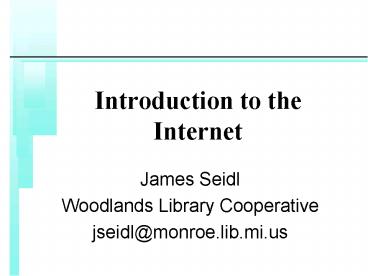Introduction to the Internet - PowerPoint PPT Presentation
1 / 28
Title:
Introduction to the Internet
Description:
http://albion.lib.mi.us/train/index.htm. http = hypertext transfer protocol ... no news groups. Next class. Albion College-Rob Hall. 2nd floor computer lab. 7: ... – PowerPoint PPT presentation
Number of Views:24
Avg rating:3.0/5.0
Title: Introduction to the Internet
1
Introduction to the Internet
- James Seidl
- Woodlands Library Cooperative
- jseidl_at_monroe.lib.mi.us
2
Forks Project
- Albion College
- Albion Public Library
- Friends of the Public Library
- www.forks.org
3
What is the Internet?
The Internet covers the globe and includes large,
international networks as well as many smaller,
local-area networks (LANs).
4
Who owns the Internet?
- Nobody
- Its a cooperative network
5
Why use the Internet?
- Communications
- Information access
- Commercial uses
6
Personal uses
- Family
- Friends
- Colleagues
- Save time and money...
- Its fun...
7
Example of an e-mail message
8
Types of networked information
- Documents
- Software
- Databases
- Lots of junk!
9
Where the Net is going
- Commercial
- Advertising
- Sales
- Customer relations
- Banking
- E-commerce
10
World Wide Web
- a.k.a. the Web (WWW)
- Provides most of Internets multimedia and
interactive data - Forum for marketing and direct sales
- The future of the Internet
- Requires Web browser software
- Requires higher bandwidth and more advanced PC
hardware and software than other services
11
Example of a web site
12
Parts of the URL
http//albion.lib.mi.us/train/index.htm
The name of the computer which houses the
document Its like the city of a post address
house address The actual name of the document -
its like the actual
http hypertext transfer protocol
The directory path - its like a street name
13
Uniform Resource Locators(a.k.a. URLs)
- The Michigan Electronic Library
- http//mel.lib.mi.us/
- Library of Congress
- http//www.loc.gov/
- Historical Documents
- gopher//ucsbuxa.ucsb.edu3001/
- 11/.stacks/.historical
14
Internet addressing scheme
- Each computer on the Internet has a unique
address - Addresses administered and organized by the
Domain Name System, or DNS - system by which all Internet addresses are
created, maintained, and specified by users - http//www.ibm.com
- http//www.forks.org
15
DNS internet address anatomy
16
Domain name extensions
Organization Commercial organization Educational
organization Government agency U.S.
Military Internet Service Provider Not-for-profit
organization
Example www.microsoft.com www.ohio-state.edu www.u
sdoj.gov www.army.mil www.uunet.net www.rotary.org
Extension com edu gov mil net org
17
DNS country codes
Country Canada Switzerland Germany France Japan Ne
therlands England United States
Code ca ch de fr jp nl uk us
Example www.freenet.calgary.ab.ca www.olsen.ch www
.muenchen.de www.clipnet.imaginet.fr www.phys.tosh
o-u.ac.jp www.cs.ruu.nl www.nik.uk www.saucony.com
.us
18
Mailing lists
- Thousands of topic-specific discussion groups
- Based on standard e-mail service
- Provide an automatic bulletin board environment
- Epitomize the Internet as a global village
- Require only standard e-mail software
- Require minimal bandwidth
19
Newsgroups
- 29,000 topic-specific forums
- Conference-type, text-based messaging
- Similar to mailing lists
- Less automated than mailing lists
- Require special news reader software
- Require minimal bandwidth
20
Connection types
Direct fastest bandwidth most expensive only
available to businesses
- Dial-up
- slowest bandwidth
- most inexpensive
- very common
21
Dial-up ISP connection
22
Whats needed - PPP access
- Computer
- 486 or better, with 8 MB of RAM
- Windows 3.1, 95, 98, (or a Mac)
- Modem
- At least a 14.4 bps, preferably a 28.8, 33.6 or
56 bps - Phone Line
23
Whats needed - PPP access
- Software
- Comes with Windows 95, 98 and MacOS 7.5
- Commercial packages
- Netscape Navigator - Personal Edition (40)
- Microsoft Internet Explorer
24
Emerging connectivity types
- Cable modem
- from local cable television provider
- very high bandwidth (50 of T-3)
- Satellite dish
- available anywhere with proper equipment/software
- bandwidth only 33 of a T-1
- DSL (Digital Subscriber Line)
- in its infancy
- bandwidth is 4 times more than a T-1
25
Bandwidth comparison chart
26
ISP
- Internet Service Provider
- AOL
- MSN
- monthly fee
- content
27
Forks.org
- Low cost access
- no email
- no news groups
28
Next class
- Albion College-Rob Hall
- 2nd floor computer lab
- 700 pm to 830 pm































